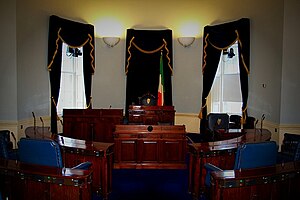Rumours were flying at the time that a FF politician had received a secret payment of over a million from someone in business, but libel laws prevented us from naming him. I think it is safe to say, 15 years later, that the person concerned was a certain Charles J. Haughey.
I’m going to do it! I’m going to name the mystery Fianna Fáil TD! Yes, in print, right here – and I don’t care if they sue!
I name him Edna. It’s a nice name, no? Edna the mystery TD.
Our libel laws are such fun. We’re only talking about rumours here, but you can’t report what the rumours are – even if you add that personally you disbelieve them. They’ve happily said on radio that the name of a “very prominent Fianna Fáil TD” is being bandied around. To this we can add the fact that we are, presumably, talking about a millionaire here – unless he spent the lot. But you can’t say “so obviously they mean Edna.”
It’s getting lovely and baroque. People are not just denying that this or that person received cash, they’re denying that they’ve even heard rumours that this or that person did or did not receive cash. Allegedly. You’ve got to be careful in print. This is because, you see, the printed word has authority.
Bollocks. The big difference between slander and libel is that if you just say something you can turn around and deny you ever did. If you set it in type and distribute several thousand signed copies, you’re digging your own grave.
And you definitely can’t use the word ‘corruption’. People can give as much money as they like to other people, even politicians. They’ve a right to. And they can do it in secret if they wish, and they don’t need to ask for a thing in return. People often give you cash for no reason whatsoever, don’t they? There’s absolutely no grounds to assert that these donations represent any distortion of the democratic system, just because some people have more money than others and they’re kind enough to give it to the people who make the laws. It’s necessary for democracy, if we want well-run, efficient political parties. I hope that makes everything clear.
Or put it another way: “Don’t sue me.”
Just a second… They can only sue you if you’ve got something to lose. And I, am completely flat broke. In fact I owe a bit to the revenue commissioners, which is actually extra insurance. The tax man gets first shout in bankruptcy cases, so even the property I own (a portable stereo and four shelves of books) wouldn’t go to anyone who sued me.
Prison? Yeah, I could end up in jail I suppose. But three square meals a day, regular sleep and no pubs is just what the doctor ordered for me right now. I mean literally. He said if somebody else had done to my body what I’d done to it myself, they could be charged with assault.
So I’m sue-proof, I can say any damn thing I like! Great. It’s about time it was said out loud, once and for all, that [CENSORED].
Oh yeah, the paper’s still got something to lose, I forgot that. This is a problem. But I’m a publishing company now, (more on this next week), so maybe I should run off a few thousand copies and distribute them personally. That’d be a heroic act. I can just see myself handing out these bits of paper bearing the huge, dark secret.
And everybody will say “But I knew that”, and I’ll have to explain that by writing down something everybody knows on a piece of paper, I’ve achieved a great moral victory at huge risk to myself. And they’ll look at me like I was very strange.
As I write, Bertie Ahern is on the radio arguing – somehow – that the alternative to political donations is dictatorship. Jesus… Okay, okay, please don’t declare a dictatorship. We’ll do anything. How much do you want?



